Actions ESL Games & Activities
Action Verbs Bingo
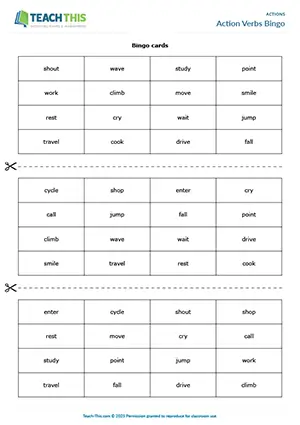
ESL Action Verbs Game - Vocabulary and Speaking: Bingo, Matching, Forming Sentences, Freer Practice - Group Work
In this enjoyable action verbs game, students play bingo by listening to definitions and matching them to common action verbs. To begin, the bingo caller reads a definition at random from the caller's sheet...
Action Verb Races
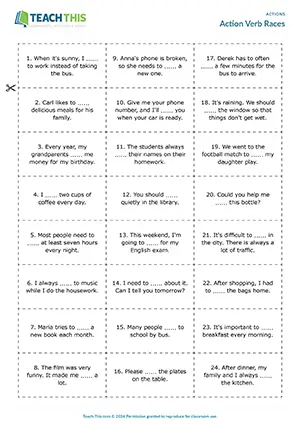
ESL Action Verb Games - Vocabulary and Speaking: Matching, Gap-fill, Forming Sentences, Freer Practice - Group Work
Here are two free action verb games to help students practice everyday actions. First, students play a gap-fill and matching game. In groups, students take turns picking up a sentence card, reading it...
Everyday Actions
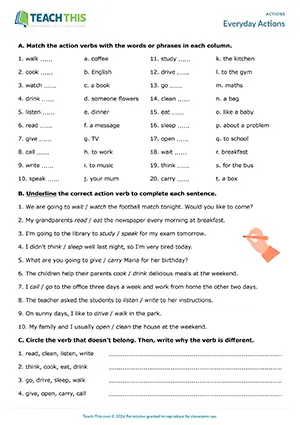
ESL Action Verbs Worksheet - Vocabulary and Writing Exercises: Writing Sentences - Speaking Activities: Asking and Answering Questions, Freer Practice - Group Work
Here is a comprehensive actions worksheet to help students practice common verbs related to everyday actions. First, students match action verbs with words...
Physical Movement Mime
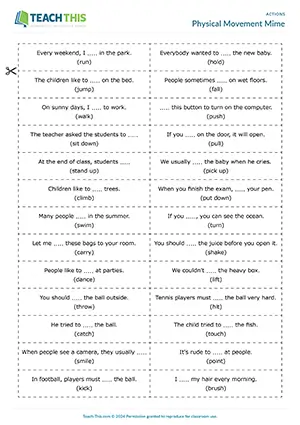
ESL Actions Game - Vocabulary: Miming, Guessing - Group Work
In this fun actions game, students read sentences and then mime or guess the missing verbs of physical movement. In competing teams of two, students take turns picking up a card and reading the sentence using the word 'blank' for...
Action Talk
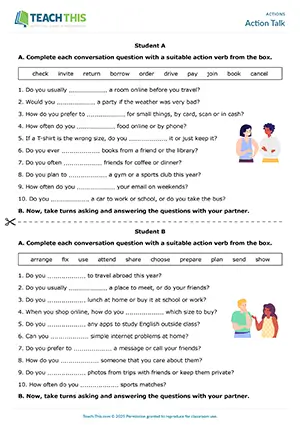
ESL Action Verbs Activity - Vocabulary and Speaking: Gap-fill, Asking and Answering Questions, Controlled and Freer Practice - Group and Pair Work
In this insightful action verbs activity, students complete, ask and answer conversation questions that contain action verbs. First, students complete each...
Move It!
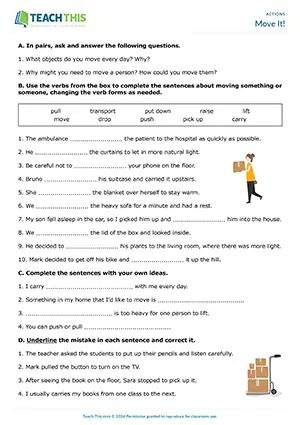
ESL Actions Worksheet - Vocabulary Exercises: Sentence Completion - Speaking Activity: Asking and Answering Questions, Freer Practice - Pair Work
Here is a useful actions worksheet to help students practice common verbs related to moving something or someone. First, in pairs, students discuss two...
Say it, Do it, Describe it
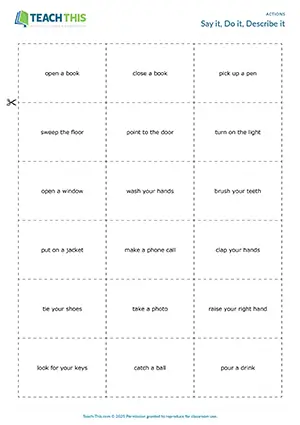
ESL Actions Activity - Vocabulary, Grammar and Speaking: Giving and Following Instructions, Miming, Describing Actions, Sequencing Routines - Pair Work
In this entertaining actions activity, students give and follow simple instructions, describe actions in progress and sequence short action routines. In pairs, one student...
True or False Actions Game

ESL Action Verbs Game - Vocabulary and Speaking: Forming Sentences, True or False, Asking and Answering Questions, Freer Practice - Group Work
Here is an entertaining actions game to help students practice common action verbs. In groups, players take turns picking up a verb card and placing it face-up...
Here's what our members are saying...
